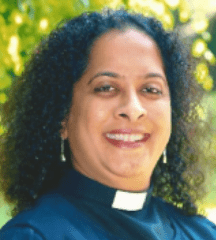Opinion
Living Faith: Why we must all put our trust in God this Easter
Revd Smitha Prasadam
This article is more than 3 years old.

Easter reminds us how important it is to trust in God (photo: Pixabay)
Open any Bible in the middle, and you get the Psalms – every time. It’s the song book of God’s people and holds all human life and emotion. They are songs of praise, ecstasy, tenderness, trouble and lament where we are invited “to sing our way through hell – and into heaven”.
Lament for all warzones
How appropriate then that these are the songs that prefigure all the Easter ceremonies. On Maundy Thursday, following a joyful celebration of the institution of the Lord’s Supper and a reminder of Jesus’ Mandatum or commandment to “Love one another as I have loved you,” the church’s liturgy turns to much bleaker moments. It is forcing us into a life and death situation to hear the desolate cry of abandonment, anguish and fear.
The lament of Jesus in the garden of Gethsemane, just before his crucifixion is ever more poignant given the lament of people in Mariupol, Kharkiv and Kyiv: “O Lord, God of my salvation, when at night, I cry out in your presence, let my prayer come before you; incline your ear to my cry. For my soul is full of troubles, and my life draws near to Sheol.”
The most gracious thing the church is called to do is to intercede for others because we are joined with one another. We sing lament songs because someone else, somewhere else, is hurting. And as we sing – we bring their names, their situations and their lives before God. And ours too. And this Easter, St Alban’s Church will be doing this with greater intensity than ever. “Save me, save us, save them O Lord” in Ukraine, Syria, Yemen, Myanmar and more.
Absolute trust in a just God
This must be our response to the horrific images on TV as we show empathy, stand in solidarity and cry to heaven.
The psalms offer us story and history, past, present and future, all rolled into one. They demand to be on our lips in shared distress as we witness mass destruction. For God, mighty and faithful, hears and delivers.
The psalms are individual, communal and open-ended prayers adaptable to every person and situation worldwide. They offer honest introspection in the company of others and the compassionate presence of God who hears and helps. I wonder if you dare pray like this?
“Vindicate me. Repay my enemies for their evil. Put an end to them.” These are shocking, painful, honest words. But they reveal absolute trust in the God of justice. God will not fail in a time of crisis, says the psalmist. The enemy will not prevail. Actions have consequences – and God – who has the power to decide – will do so with justice and to set things right.
God hears our prayer
The Bible is full of stories of people whose lives were threatened by their enemies – who called out to God in their need. Most especially at Easter we remember Jesus who lamented over Jerusalem, wept at the grave of Lazarus his friend, and called out in his hour of need: “Take this cup away from me.”
Jesus taught his disciples to pray with this same honesty in the Lord’s Prayer: “Your will be done on earth as it is in heaven … Deliver us from evil.” In other words: be faithful; trust God. Even in the midst of opposition and suffering.
God’s power and purpose is greater than that of the enemy. Crying out to God in our distress is already to be in touch with the source of enduring life and strength. Death will never have the final word.
God is present and intimately involved in the world – even where brokenness and pain are real. After all, the cross and the resurrection are not separate but continuous and simultaneous realities.
As people of faith, we will always find it necessary to pray: a petition, praise and profession of faith woven together. Of this we can be sure. God hears our prayer – and is our helper. Through brokenness and war, may we glimpse life and eternity.
Happy Easter everyone.

About
Revd Smitha Prasadam
Born in India, adopted by Wales and England, Smitha (chaplain@st-albans.dk) is the priest of St Alban’s Church. Recently appointed Honorary Canon of the pro-Cathedral in Malta for outstanding work in Copenhagen and for bettering the cause of racial justice in the Church of England, she has travelled widely, working in advisory and advocacy capacity on matters of liturgy, vocation and social justice










































